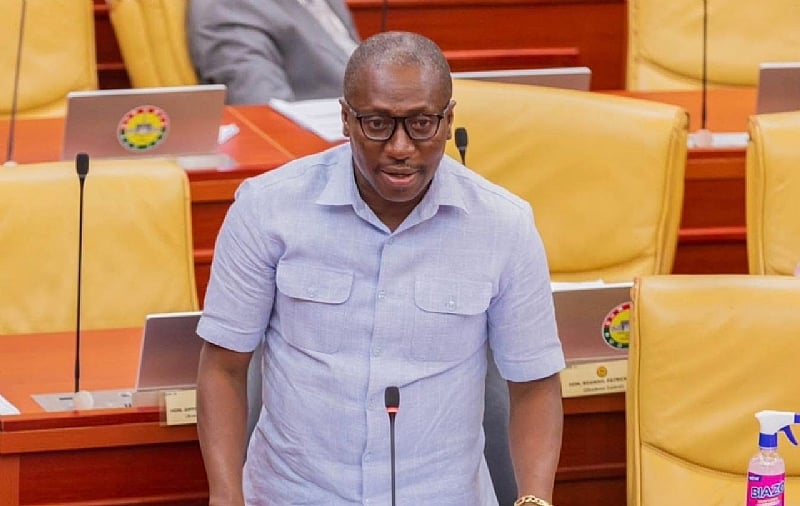The political landscape of Ghana’s Parliament has undergone a significant shift with a reshuffle of the National Democratic Congress (NDC) leadership, prompting calls for collaborative governance and efficient parliamentary proceedings. Alexander Afenyo-Markin, the Minority Leader and Member of Parliament for Effutu, extended congratulations to the newly appointed Majority leadership and pledged the Minority’s commitment to working across party lines to bolster Ghana’s democratic foundations. He emphasized the importance of respecting established systems and structures, assuring the nation that while party affiliations exist, the ultimate focus should be on the effective functioning of the government for the benefit of all citizens. This collaborative spirit, Afenyo-Markin suggested, should extend to streamlining parliamentary debates to facilitate efficient government business, seemingly advising the new Majority Leader, Mahama Ayariga, to avoid excessive debate that could potentially hinder progress.
The reshuffle within the NDC was precipitated by President John Dramani Mahama’s appointment of the previous Majority leadership to ministerial positions within his cabinet. Dr. Cassiel Ato Forson, the former Majority Leader, transitioned to the crucial role of Finance Minister, tasked with steering the nation’s economic policies. His deputy, Emmanuel Armah-Kofi Buah, assumed the responsibilities of the Minister for Lands and Natural Resources. Similarly, Kwame Governs Agbodza, the former Majority Chief Whip, moved to the Ministry of Roads and Highways, while his deputy, Ahmed Ibrahim, took on the portfolio of Minister for Local Government and Chieftaincy Affairs. These appointments represent a significant shift in power dynamics within the NDC and the government, bringing new faces and perspectives to the forefront of parliamentary leadership.
The new leadership structure of the NDC in Parliament sees Mahama Ayariga, the MP for Bawku Central, assuming the role of Majority Leader, supported by George Kweku Ricketts-Hagan, MP for Cape Coast South, as his deputy. Rockson-Nelson Kwami Etse Dafeamekpor, MP for South Dayi, has been appointed as the Majority Chief Whip, responsible for maintaining discipline and ensuring the smooth flow of parliamentary business. His team includes Comfort Doyoe Cudjoe, MP for Ada, as the first deputy Chief Whip, and Richard Acheampong, MP for Bia East, as the second deputy Chief Whip. This new leadership team faces the challenge of consolidating their positions, establishing their authority within the NDC caucus, and navigating the complexities of parliamentary procedures.
Afenyo-Markin’s call for collaboration comes at a critical juncture in Ghana’s political landscape. The reshuffle within the NDC and the subsequent appointment of a new Majority leadership team presents an opportunity for fresh perspectives and renewed commitment to efficient governance. His emphasis on minimizing excessive debate, while potentially seen as a strategic move to ensure smooth passage of government business, also underscores the need for a collaborative approach to address the nation’s challenges. While robust debate is a cornerstone of a healthy democracy, Afenyo-Markin’s suggestion hints at the need to strike a balance between thorough deliberation and timely action, particularly when dealing with pressing national issues.
The shifting political dynamics within Ghana’s Parliament underscore the fluidity of power and the importance of adaptability in the face of change. The transition of key NDC figures from parliamentary leadership to ministerial positions necessitates a period of adjustment for both the newly appointed leaders and the parliamentary body as a whole. The effectiveness of the new leadership will depend on their ability to build consensus within their own ranks, navigate the intricacies of parliamentary procedure, and engage constructively with the Minority to advance the nation’s agenda. The challenge lies in finding common ground while maintaining distinct political identities and pursuing sometimes diverging policy goals.
Ultimately, the success of Ghana’s democracy rests on the ability of its political leaders to prioritize the nation’s interests above partisan considerations. Afenyo-Markin’s call for collaboration and his emphasis on the importance of systems and structures over individual affiliations offer a promising starting point for the newly constituted Parliament. The challenge for both the Majority and the Minority will be to translate this rhetoric into concrete action, demonstrating a commitment to working together to address the complex challenges facing the nation and strengthen the foundations of Ghana’s democratic institutions. The coming months will be a crucial test of their ability to forge a collaborative and productive working relationship, ultimately shaping the trajectory of Ghana’s political landscape.


